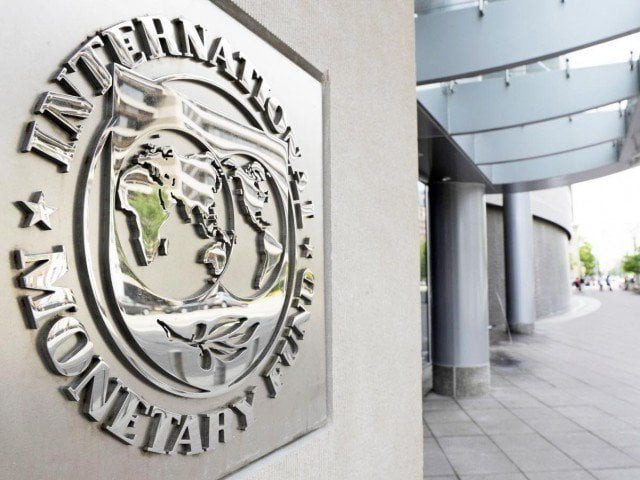Govt to revive moribund sell-off plans ahead of IMF meet
Lender is likely to hold talks with Pakistani officials on Feb 23

International Monetary Fund. PHOTO: AFP
The decision to revive the unofficially suspended privatisation programme was taken during a meeting in the finance ministry on Tuesday. However, the decision has been rooted in the upcoming talks between the IMF and Pakistan that are tentatively scheduled for February 23, according to finance ministry officials.
Govt to sell off Haveli Bahadur Shah power plant
This is the first time that Pakistan and IMF will be holding formal talks after expiry of $6.2 billion programme in September last year. The talks will be held under Article-IV and the IMF’s ‘advice’ will not be binding on the government.
The government on Tuesday discussed the status of Pakistan International Airlines (PIA), Pakistan Steel Mills (PSM), Kot Addu Power Company (Kapco), Mari Petroleum Company and the power sector.
During the meeting, Finance and Privatisation Minister Ishaq Dar blamed others for no progress on the privatisation agenda during 2016, ministry officials said. The minister is said to have blamed the water and power secretary and the Privatisation Commission (PC) for zero progress on privatisation, they added.
However, non-resolution of inter-ministerial disputes and political backpedalling were the main reasons for the failure of the privatisation programme, according to the sources.
The water and power secretary was blamed for not proceeding further on the issue of giving a comfort letter in case of the Power Purchase Agreement (PPA) of Kapco that is expiring in 2021, said the sources.
After coming into power, the PML-N government had initiated work on 26 transactions but due to political expediency, it suspended the privatisation process in case of 14 entities. This was despite the fact PC has completed the necessary technical work in most of the cases.
The government shelved the work on OGDCL, Fesco, Iesco, Lesco, Gepco, Qesco, Pesco, Mepco, Hesco, Sepco, JPCL, CPGCL, LPGCL and NPGCL. However, it managed to earn more than $1.7 billion through easy capital market transactions. Such transactions do not meet the objectives of privatisation such as improved service delivery to the people and minimising losses to the public exchequer.
Despite being dubbed as among the top most priorities of the PML-N government and conditioned under the $6.2-billion IMF programme, the government’s attempt to privatise all lossmaking entities and the power sector was nothing less than a flop.
The Q Block has become a graveyard of many privatisation summaries sent for their onward transfer to Prime Minister’s Office. Even after two years, the finance ministry did not take a decision on a summary sent for seeking directions whether the PSM should be treated as a ‘going concern’ or be liquidated.
'Pakistan headed towards another IMF bailout'
The government halted multibillion-dollar privatisation of all power distribution and generation companies for fear the sell-off would cost it the next parliamentary elections. It never concluded Faisalabad Electricity Supply Company (Fesco) privatisation process after inviting statements of qualifications (SOQs) from prospective investors. PC had been working on the sell-off process of 14 state-owned enterprises in the power sector and financial advisers had already been appointed.
In October last year, the privatisation process of Kapco, Pakistan’s largest independent power producer, ran into snags due to government’s inability to provide investors with a satisfactory response over the fate of a power purchase agreement and shift in state’s coal consumption policy. The indecisiveness on the part of the ministries of finance and power even hurt Kapco’s share price at that time. A consortium of financial advisers hired to sell shareholding in the 1,600-megawatt power plant had advised the government to address half a dozen issues timely in order to fetch a better price, according to the advisers’ report.
Prime Minister Nawaz Sharif had made the privatisation of PIA a top goal when he came to power in 2013. His very first meeting as Prime Minister of Pakistan was on the issue of PIA privatisation. The government on Tuesday decided to separate core and noncore operations of the PIA before the IMF meeting.
In April last, year, parliament amended the PIA law to convert the entity into a limited company but it prevented the government from selling majority stakes and giving up management control. Fierce resistance to privatisation by opposition parties and labour unions made the programme politically sensitive and the government budged to these pressures.
PSM, meanwhile, has been closed since June last year despite the government having pumped in more than Rs25 billion of taxpayers’ money. In October last year, the finance minister, in his capacity as chairperson of the CCoP, had decided to offer the entity to the Sindh government. That time, PC had taken the transaction structure of the PSM for the CCoP’s approval. But the CCoP declined the transaction structure after which Dar decided to offer the country’s largest industrial unit to the Sindh government on as-it-is-basis. On Tuesday, it was decided to make another push for PSM handover to private sector, this time on lease.
Published in The Express Tribune, January 4th, 2017.



















COMMENTS
Comments are moderated and generally will be posted if they are on-topic and not abusive.
For more information, please see our Comments FAQ